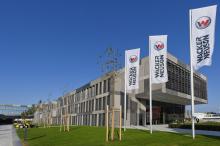The combined half-year accounts of the merged Royal Haskoning and DHV showed profits up 9% despite the tough market conditions. Both former companies contributed equally to an operating profit (EBITA) over the first six months of 2012 at €13.9 million.
RSSThe combined half-year accounts of the merged Royal Haskoning and 6122 DHV showed profits up 9% despite the tough market conditions.
Both former companies contributed equally to an operating profit (EBITA) over the first six months of 2012 at €13.9 million.
Net result in the same period was €7.2 million, a 9% increase on 2011’s figure. At €362 million, revenue was down by 10%, of which 4% was due to the divestment of a Canadian subsidiary, which was executed in the second half of 2011. The remaining decrease of 6% was due to the difficult economic circumstances with some restructuring having been implemented in the first half of 2012.
The public sector market remained difficult in the Netherlands and the UK in combination with downward pressure on prices. Operations in Africa performed well, while results in Asia lagged behind.
Royal HaskoningDHV sees growth opportunities in countries and regions including India, the Asia Pacific, the Middle East, South Africa and Brazil. On the project front, the first full-scale municipal sewage treatment plant using the Nereda energy-saving technology was opened in the Netherlands. The company reports that Nereda has created significant international interest and that the number of Neredas in and outside the Netherlands is growing steadily.
The company’s subsidiary NACO is advising the international consortium responsible for the management and development of Viracopos International Airport in Brazil.
Before the merger, DHV and Royal Haskoning worked together in a consortium for the Mekong River Delta in Vietnam. The area is the size of the Netherlands and is home to 17 million people who need protection against flooding. In Oman, Royal HaskoningDHV is working on the Port of Duqm, an area five times the size of Heathrow.
Both former companies contributed equally to an operating profit (EBITA) over the first six months of 2012 at €13.9 million.
Net result in the same period was €7.2 million, a 9% increase on 2011’s figure. At €362 million, revenue was down by 10%, of which 4% was due to the divestment of a Canadian subsidiary, which was executed in the second half of 2011. The remaining decrease of 6% was due to the difficult economic circumstances with some restructuring having been implemented in the first half of 2012.
The public sector market remained difficult in the Netherlands and the UK in combination with downward pressure on prices. Operations in Africa performed well, while results in Asia lagged behind.
Royal HaskoningDHV sees growth opportunities in countries and regions including India, the Asia Pacific, the Middle East, South Africa and Brazil. On the project front, the first full-scale municipal sewage treatment plant using the Nereda energy-saving technology was opened in the Netherlands. The company reports that Nereda has created significant international interest and that the number of Neredas in and outside the Netherlands is growing steadily.
The company’s subsidiary NACO is advising the international consortium responsible for the management and development of Viracopos International Airport in Brazil.
Before the merger, DHV and Royal Haskoning worked together in a consortium for the Mekong River Delta in Vietnam. The area is the size of the Netherlands and is home to 17 million people who need protection against flooding. In Oman, Royal HaskoningDHV is working on the Port of Duqm, an area five times the size of Heathrow.






